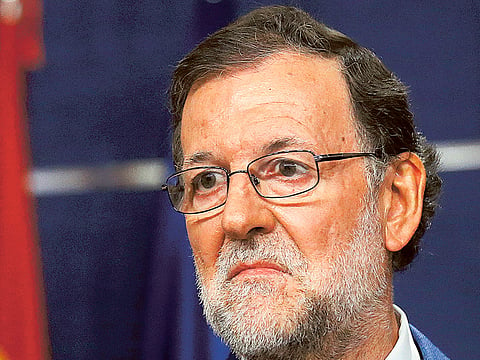Rajoy seeks support to avert Spain’s third election in year
Spanish leader seeks to end an eight-month political impasse

Madrid: Caretaker Prime Minister Mariano Rajoy will ask the Spanish Parliament to back him for a second term on Tuesday, as he seeks to end an eight-month political impasse.
Rajoy has secured support from the liberals of Ciudadanos and a lone nationalist lawmaker from the Canary Islands, giving him 170 votes in the 350-seat chamber.
But with all the other party leaders opposed to Rajoy’s candidacy, the incumbent is set for defeat unless the grandees within the Socialist Party can persuade its leader, Pedro Sanchez, to back down at the last minute. Rajoy needs a majority to get through when the debate concludes on Wednesday. If he loses, a plurality will suffice at a second ballot on Friday.
Rajoy is trying to piece together the first administration since Spain’s traditional two-party system broke down with the emergence of Ciudadanos and the anti-establishment party Podemos at last December’s election. While Rajoy’s People’s Party was the only group to increase its vote at a rerun in June and he has considerable common ground with the Socialists on policy, he’s struggling to clinch enough support because of unresolved corruption allegations against his party. If he fails this week, he has another two months to rustle up the votes before King Felipe has to call a third election.
“The important thing in this occasion is that the countdown is being triggered,” said Antonio Barroso, a London-based political analyst at Teneo Intelligence in London. “It’s unlikely that Rajoy manages to win the vote.”
The acting premier is scheduled to address parliament in Madrid from 4pm local time. His allies and opponents get to respond on Wednesday and then vote at the end of the day. If the parties fail to reach a colony by the end of October, the timings set out in Spanish election law mean the next election could fall on Dec. 25.
“We risk being seen as a joke by our fellow citizens as well as people overseas,” Rajoy said at a press conference in Madrid Tuesday. “This hasn’t happened to any European country since World War II.”
Still, a Christmas ballot would probably help the acting prime minister because PP voters have historically been more likely to turn out than supporters of other parties.
One thing that could change the political calculus before the deadline expires is the result of regional elections in the Basque Country and Galicia, a traditional PP fiefdom. Once those ballots are out of the way, national leaders may have more room to manoeuvre. Sanchez signalled Monday he may be prepared to change his stance if the situation shifts and Rajoy said he will keep trying to broaden his support even if he loses this week.
“Once the Galician and Basque elections are out of the way, we could see a scenario that is more conducive to compromise,” Narciso Michavila, chairman of the polling company GAD3, said in a telephone interview.
While most analysts argue that the resilience of the PP vote would make Rajoy the main beneficiary of a third election, the premier would likely be campaigning against a slew of fresh revelations about his party because the National Court is due to start the first of several PP corruption trials in October. That trial may also make it harder to bring round the Socialists as the Oct. 31 deadline approaches.
“The corruption allegations against the PP increase the price for the Socialists if they agree to any compromise to allow Rajoy to stay in power,” said Lluis Orriols, a political scientist at Madrid’s Carlos III University.



